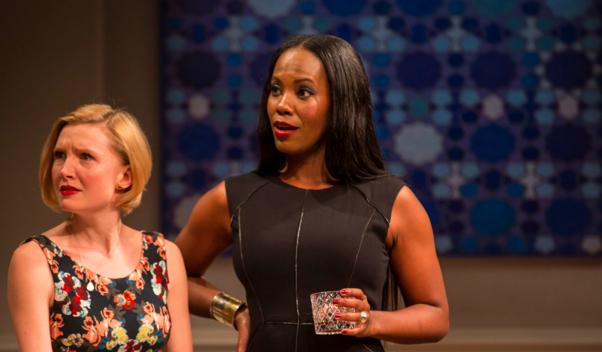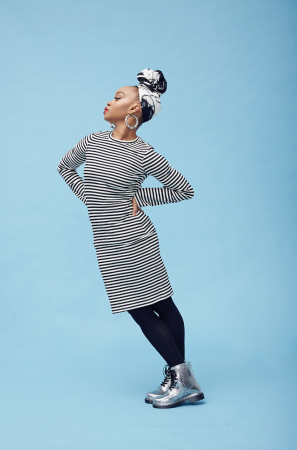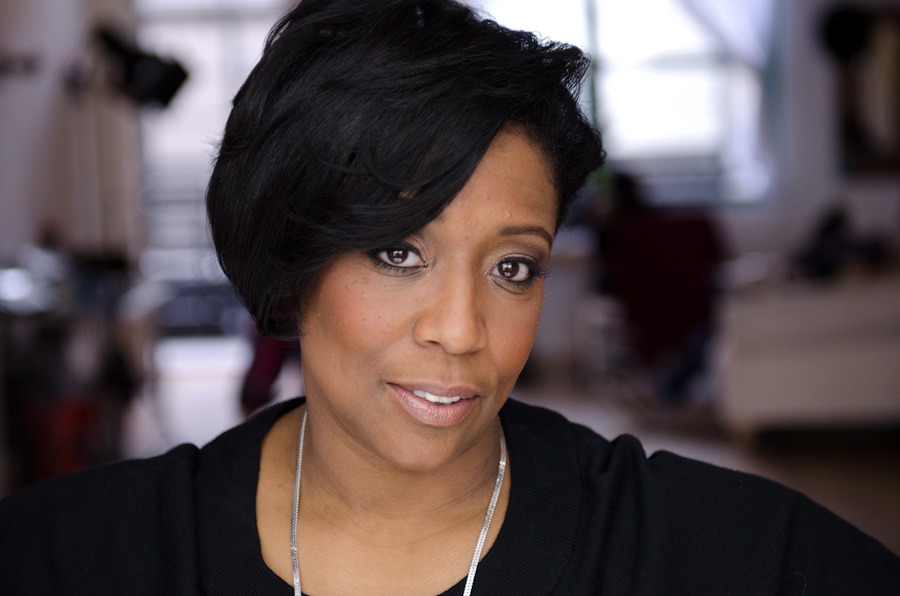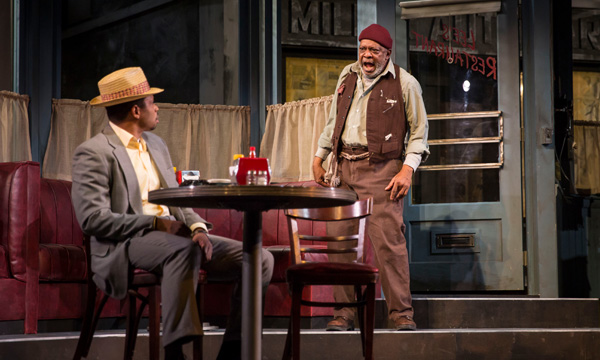

Features
In Depth: Zakiya Young Stars in Disgraced at the Goodman Theatre
Published
10 years agoon
Broadway actress and singer Zakiya Young is currently starring in DISGRACED by Ayad Akhtar and directed by Kimberly Senior at the Goodman Theatre in Chicago. From its website:
Amir Kapoor has turned his back on his upbringing in pursuit of the American Dream—he’s married to a beautiful woman, lives in a luxurious Manhattan apartment and is eyeing a lucrative promotion at his powerful law firm. But when Amir hosts a dinner party for his African American co-worker and her Jewish husband, the initially pleasant evening erupts into a volatile argument over race, religion and class in the modern world.
Broadway Black had an opportunity to learn more about Young’s character, her background, her first Broadway show, and what’s next!
BroadwayBlack (BB): Discuss the role of Jory and what nuance is brought to the character because she is Black. How does her race affect her interaction with the other characters?
Zakiya Young (ZY): Jory is very complex and I love playing this character. She’s a smart, successful lawyer – specializing in mergers and acquisitions at a prestigious law firm. Jory is confident, funny and suffers no fools. She does whatever it takes to succeed at work – which includes assimilating into white culture and “playing the game.” She’s the epitome of the American Dream.
Jory is very conservative – she believes in order, not justice – which is something that I struggled with at first. However, it’s not my job to judge the character. It’s my job to share her story with honesty and integrity.
Being a black woman makes Jory a little bit more sensitive to the tone of the evening. Every once in a while she’ll remind the party guests that she’s a woman of color but she tends to only use her race as a trump card to win arguments. She also notices things about her friend Amir during the dinner party that the white characters might not pick up on – micro-aggressions toward Amir about race/culture.
BB: Disgraced is officially the most produced play of the 2015/2016 Season, only the third time a playwright of color has occupied the number one spot. What does it mean to you to be involved in the production?
ZY: I’ve been trying to do this play since it was off-Broadway. I haven’t been able to forget it since I first read the script. Ayad has crafted such a bold, powerful and honest piece and it’s such an honor to be telling this story at this time – with this cast and creative team – at The Goodman. It seems as if our country is about to collapse under theweight of misunderstandings and assumptions about race, religion and social class. We need to go beyond being politically correct, have the tough conversations, ask questions, and really listen to each other. This play is an amazing way to begin that conversation because it forces you to think about the issues presented.
 BB: Both of your parents are artists. How did having that background influence your upbringing? Do you consult with them about auditions? Do they provide advice or notes, more or differently than a non-performing parent would?
BB: Both of your parents are artists. How did having that background influence your upbringing? Do you consult with them about auditions? Do they provide advice or notes, more or differently than a non-performing parent would?
My dad has an amazing singing voice – he’s a bari-tenor- and until very recently he sang in the church choir every Sunday since he was a little boy. My mom did plays in college, was the president of the drama guild at Fayetteville State and still performs dramatic monologues at church.
Our house was and still is filled with music and dancing. They put my sister and I in dance classes, piano lessons, we both played in our school bands, sang in school choirs, church choirs etc.
My fondest childhood memories center around art – waking up and hearing my dad singing downstairs as he cooked us breakfast, having family sing-alongs in the car as we drove down south every August, dance parties in the living room, hearing my mom recite her favorite poems by Langston Hughes and Maya Angelou. They took us to many different artistic events around the country. Even when we were on vacation in the middle of nowhere, my parents would find some kind of artistic event for us to attend.
My sister Jamila and I often sang together and I accompanied us on the piano. I did a benefit concert at my parents’ church a few years back and it was awesome to have my dad and sister join me for a song.
I do talk to my parents about certain auditions – especially if I’m in final callbacks for a project I’m really excited about. My mom always sends me encouraging texts before my auditions. Sometimes I ask for advice and sometimes they just give it. It’s the beautiful thing about family – they keep me humble and tell me the truth in love. My mom is super positive and enthusiastic – she sandwiches a suggestion between positive statements. Whereas my dad – hearing me practicing the piano for example – would come in and say “Not bad. Almost there! Keep practicing.” But they’re very proud of me and it’s a blessing to have parents who support me and challenge me to do my very best.
Also, if I’m visiting them in Pennsylvania and I get a last minute audition that I have to put on tape, I know that I can ask any of them to help me and they’ll all be great readers for the scene – especially my mom.
They’ve seen all of my shows and I would not be able to do any of this without the love and support of my family.
BB: You’re both an actress and a singer. As you progress in your career, do you find yourself gravitating toward one or the other?
ZY: I’m grateful to be able to do both plays and musicals and I honestly don’t have a preference. I just love performing. I’m especially grateful for the casting directors who saw a resume full of musicals but took a chance and started calling me in for plays. However, when I’m in a play I do find myself searching for karaoke opportunities or a piano I can play during my downtime.
BB: You booked your first Broadway show without an agent. Quite a feat! Why did you decide to go that route? Would you recommend this to other aspiring actors?
ZY: I never expected it to work out the way it did – but I’m super happy with how things unfolded. I took a two and a half year break from auditioning. I was burnt out and needed time off to figure out whether or not my heart was still in pursuing this career, so I took an office job. When I started thinking about performing again, I went to an EPA (Equity Principal Audition) because I didn’t have representation at the time. It was day 2 or 3 of EPAs for the original Broadway company of The Little Mermaid. I figured it was already cast and would be a “safe” introduction back into the audition room so I went to the EPA, signed up for a time, went to a voice lesson then came back and sang. A few months later I got a call asking me to come back in for an ensemble audition. A few callbacks later I got the call from Tara Rubin’s office telling me I had booked the job. It was right before Christmas and I was absolutely overjoyed. It was such a wonderful moment.
Would I recommend this to other aspiring actors? Absolutely. Equity calls are wonderful – they really are looking for talent at those auditions. Don’t believe people who say they’re a waste of time – you never know who you’re going to meet in the room. And regardless of whether or not you have representation, if you can’t get an appointment for a certain role, go to the EPA or the chorus call. There’s always a way to be seen by different casting offices and I’m grateful to our union for providing those opportunities.
BB: You’ve been on Broadway. You’ve worked with amazing actors and directors, including Kenny Leon. What is next for you? What is on your bucket list of accomplishments?
ZY: What’s next? My managers and I have our eyes on a few projects and we’re excited for the future. Since The Little Mermaid and Stick Fly, I’ve had some amazing opportunities to play leading roles in musicals and do plays at some of the top theaters around the country. I’m ready and excited to take things to the next level. Playing a principal role in a Broadway musical or doing another Broadway play are on my list of what I’d love to tackle next. I’ve also started doing some television and voiceover work so I’d love to continue doing that – maybe venture into film?
I do have a list of artists I’d love to work with: Lin-Manuel Miranda, Ava Duvernay, Lee Daniels, Audra McDonald, Brian Stokes Mitchell, Phylicia Rashad, Angela Bassett, Viola Davis, George C. Wolfe and Joe Morton are some of the artists on that list.
I am incredibly grateful to do what I love – and I’m excited to see what doors God opens. His plans have greatly exceeded mine so I’m just going to stay ready and open for whatever is next.
BB: What advice do you have for aspiring and emerging performers?
Advice? Be early and prepared for auditions, rehearsals and performances. You never want a casting office to stop calling you in because you’re late and/or unprepared for auditions. And be nice to everyone you encounter. Don’t just be nice to the directors, producers, casting directors and actors you look up to. Say hello to the reader at the audition, the janitorial staff at the theater, the wranglers, costumers, security staff. It’s easier to get a bad reputation than to build a good one and believe me – directors that are unfamiliar with your work will contact people from your past for feedback on how you carry yourself in the workplace. That feedback may or may not get you the job.
DISGRACED plays through October 25 at the Goodman Theatre. For tickets and more information, click HERE.
Features
Photo Exclusive: Step into The Light with Broadway Black
Published
7 years agoon
February 21, 2019
Have you seen The Light by Loy A. Webb at MCC Theater? If you haven’t, then you need to and Broadway Black has got you. Join us on SUNDAY MARCH 3rd for the BWAYBLK Experience!
Use code BWAYBLACKMCC and pay $35 for any seat on Mar 3 at the 7:30 performance
Not every marriage proposal goes as planned. LOY A. WEBB’s THE LIGHT introduces us to RASHAD and GENESIS on what should be one of the happiest days of their lives, but their joy quickly unravels when ground-shifting accusations from the past resurface in this gripping two-character drama. Can their relationship survive the growing divide between them over who–and what–to believe?
Also, get into this amazing photo series of playwright Loy A. Webb & the cast of her play The Light. Photos by Curtis Brown were taken in the new elegantly designed and strategically welcoming Robert W. Wilson MCC theater space. Located in midtown New York on 52nd and 10th ave (511 W 52nd ST
New York, NY 10019)
On another tip, some really dope creatives will do a talkback after the Saturday matinee performance that you might be interested in attending. Make sure to RSVP.
Panelists include: Nissy Aya, Cristina Pitter, Alicia Rodis & Kavita Mehra
THIS WEEKEND SAT FEB 23rd
LOY A. WEBB’s THE LIGHT at MCC Theater delves deeply into one couples’ reckoning with an encounter with sexual violence that has left audiences asking: as a partner, a family member, a friend, how do we support sexual assault survivors? And what responsibility do artists have to create work that is trauma-informed? On SAT FEB 23 at 4:00 PM for an in-depth conversation about the power of allyship rooted in love and healing – in our lives and on our stages – in the face of trauma.
SAT FEB 23 at 4PM
THE ROBERT W. WILSON MCC THEATER SPACE
511 W52 ST
RSVP HERE.
Features
A Superhero On & Off The Stage, Camille A. Brown Brings ink
Published
7 years agoon
February 5, 2019

Camille A. Brown Photo by Whitney Browne
Camille A. Brown‘s dance company, Camille A. Brown & Dancers, tours nationally and internationally and will be presenting six performances featuring the debut of ink at The Joyce Theater NYC Feb 5-10th 2019.
Propelled by the live rhythms and sounds of traditional African and handmade instruments, Camille A. Brown’s ink celebrates the rituals, gestures, and traditions of the African diaspora. Highlighting themes of brotherhood, community, and resilience, the work seeks to reclaim African American narratives and is the final installment of Brown’s dance theater trilogy about identity.
In addition to her company works, Ms. Brown brings her passion for storytelling to her award-winning choreography for Broadway, Television, and Off-Broadway. Productions include Tony Award Winning Once On This Island, (Drama Desk, Outer Critics and Chita Rivera award nominations), Emmy Award Winning Jesus Christ Superstar Live on NBC, A Streetcar Named Desire, Choir Boy, the upcoming Magic Mike The Musical, PAL JOEY.
We had the chance to probe a little bit into the world of Camille A. Brown, and we’re grateful for the insight and wisdom with which she was able to bless us. Check out the interview below along with an excerpt from ink.
Broadway Black (BB): After forming the idea, what was the process of building ink?
Camille A. Brown (CAB): After the creative process for BLACK GIRL: Linguistic Play, I held a desire to dig even deeper and tell more stories of ritual, gestural vocabulary, and traditions of the African Diaspora. I was immediately drawn to two albums that had a significant impact on me when I was growing up. The Miseducation of Lauryn Hill by Lauryn Hill, and Like Water for Chocolate by Common. I tasked myself with creating a movement language that embodied the same raw authenticity, and vulnerability that fuels those lyrics and music.
As I began to develop the concept for ink, I wanted the dancers to represent superheroes. I couldn’t figure out why I had the urge to play with this idea until I read Question Bridge: Black Males in America. One of the men interviewed said, “I see Black people as comic book heroes because they always keep rising.” That was it! It is about showing that in our basic survival, and natural attributes we have superhuman powers. Powers to shift, overcome, transform, and persevere even within an often hostile environment. The seven sections of ink represent super powers of spirituality, history and heritage, the celebration of the Black female body, Black love, brotherhood, exhaustion, and community.
The process involves a deep collaboration with the dancers and my direction is guided by their choice making.
The space is very organic and fueled by research. My dancers, musicians, dramaturgs, and I are in constant dialogue throughout the process about the work and how it’s progressing. We don’t move forward unless we’re all on the same page.
We are building the work together. As a disclaimer, I let everyone know the process will be exceptionally tedious. Like a fine comb, I go through each beat, gage the temperature of storylines, and make sure the movement and music are always in conversation (whether aligned or in contrast).
BB: What made you want to start your own dance company and how have you sustained?
CAB: I found my love of choreography in college because I struggled with body image, and found that creating my own voice was a safe and empowering space. After graduating, I danced with Ronald K. Brown/Evidence for 5 seasons and during my second year with The Company, a friend from college (Amy Page) sent me a flyer for the Hubbard Street 2 competition which picks 3 choreographers to create work on the Company. I was chosen! That gave me the encouragement to pursue choreography. My first idea was to take an alias like female writers used to do because even at 22, I knew the playing field was not leveled and women (particularly black women) did not get as much exposure as male choreographers. Dance is revealing and vulnerable so taking an alias wasn’t a realistic option. People would have to see me as I am, but I also needed the confidence to withstand the obstacles. Not only that, having a company seemed daunting.
Ron wore so many hats. He was the director, choreographer, teacher, and also took on administrative duties. He never got a break. I wasn’t confident I could handle all of the duties.
I set work on other companies, but soon realized it wasn’t for me. 1-4 weeks working with a Company wasn’t enough time for me to really hone my skills, find my voice, and discover my personal creative process. I desired a more intimate relationship and space with my dancers and collaborators. I had my first show at Joyce SoHo in 2006, and committed to having a company in 2010.
What sustains CABD is my team. I have a company agent (Pamela Green), Managing Director (Indira Goodwine), Company Manager (Michelle Fletcher), and a production team who holds things down.
In the beginning, I was doing ALL the jobs! As time went on, my team slowly formed. It’s really about patience and perseverance. Nothing happened over night and everything is a progression.
BB: How have you had to be a superhero in your own life personally and professionally?
CAB:
Personally
Last year, I had a life-threatening experience. My appendix ruptured on tour. Appendicitis is when they remove your appendix before it ruptures, but mine actually did and the fluid was in my system for at least a week. I survived the “fatal” stage- which the doctors told me isn’t common. This started a very long year and a half which included 4 hospital stints and two surgeries (my second one was in April). This all happened during Once on This Island (I was in the hospital the first week of rehearsal and had my first surgery during tech), Jesus Christ Superstar Live, and my Company touring. I had to access my “superpowers” and push through, but thankfully I had my team and community to help me.
I’m going to be writing about the entire ordeal because it was such an integral part of my life. People see the “success”, but if they only knew the hardships I had to overcome to get to the other side.
Professionally
Being a Black female Choreographer and Director is hard. People ask me to do I feel like I’ve arrived. Absolutely not. I’m still Black and a woman- two underrepresented groups- particularly in theater. The playing field is still not leveled and I’m clear I have to work twice as hard.
I’ve had to build up strength and confidence. It is an ongoing process of gathering those superpowers. In many spaces, I’m sometimes the only woman (I was the only woman on the creative team for Jesus Christ Superstar Live), and the only black person in some rooms.
Recently two black girls at different events asked me the same exact question: How do you navigate spaces where you’re the only one.
It’s quite easy to feel intimated and shrink yourself. I know I have done that in the past. Now, I’ve found if I think about the black women before me in similar spaces, black women who are currently in similar spaces, and the next generation of black women coming after me, it makes me more confident. When it’s not just about you, it becomes a responsibility.
And even when I don’t feel like I have any superpowers, this happens…
and it refuels and encourages me to keep going. Someone is always watching.










